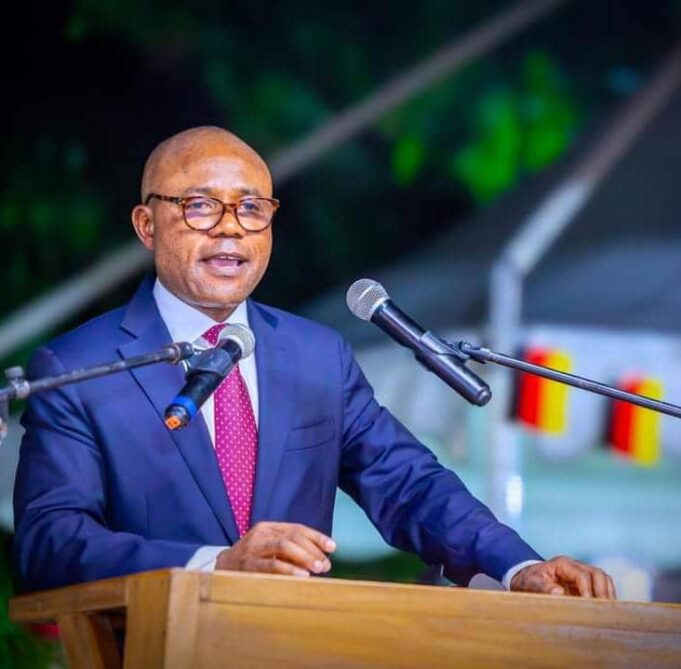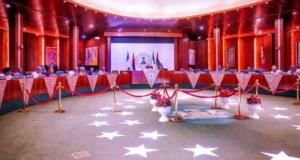Governor of Enugu State, Dr. Peter Mbah, has called on Africa to focus on strengthening regional collaboration and trade facilitation, emphasizing that the continent’s economic revival hinges on extensive trade rather than relying on charity.
Mbah, who firmly stated that Africa has all the resources needed to create its own opportunities rather than waiting for invitations, urged the continent to fully harness the potential of intra-Africa trade and the opportunities provided by the African Continental Free Trade Area (AfCFTA).
The governor made these remarks on Tuesday while delivering the closing address at the session titled “The Africa Opportunity: Regional Collaboration and Trade Facilitation,” on the second and final day of the 2025 Commonwealth Enterprises and Investment Summit in London.
The session focused on how Africa can leverage its 1.3 billion population to drive trade and investment growth.
Mbah noted that the need for such integration and trade facilitation has never been more pressing due to the numerous global and existential challenges the continent faces.
“Such a large population, plus Africa’s combined GDP of $3.4 trillion and the fact that the continent has 65 per cent of the world’s uncultivated arable land means Africa should actually be building the table – and not waiting to be invited to the table,” he said.
He went on to highlight that one of the major challenges is translating Africa’s vast potential into tangible economic growth that directly benefits its people.
He identified intra-Africa trade as a solution, emphasizing that this was one of the core purposes of the AfCFTA.
“The World Bank estimates that AfCFTA could lift 30 million people out of extreme poverty, raise incomes for 68 million people, and boost Africa’s income by $450 billion by 2035. That is about 10 years from now,” Mbah explained.
However, he expressed concerns that many of the goals set by AfCFTA, such as the removal of tariffs and non-tariff barriers, remain unfulfilled.
He pointed out the troubling reality of Africa’s annual $40 billion expenditure on food imports and questioned how such spending could be rationalized.
“The dream of a continent-wide common market remains as yet elusive. Despite our frameworks, deep-rooted structural barriers still exist: Only 14.4 per cent of Africa’s trade is intra-African, compared to 69 per cent in Europe and 59 per cent in Asia,” he said.
Mbah also highlighted the logistical challenges hampering trade across Africa. “Just seven per cent of Africa’s trade moves by air, yet we still face the highest intra-continental flight costs in the world.”
“Over 70 per cent of goods are transported by road — but poor road infrastructure and border bottlenecks cost us over $4 billion annually in lost trade,” he added.
“Maritime transport is underutilized. Only one in ten African countries has a major port efficiently connected to inland markets. Rail systems – our most cost-effective bulk trade option — remain disconnected or outdated across most of the continent.”
Despite these challenges, Mbah remained optimistic, pointing out that Europe’s Single Market took over 35 years to materialize, urging Africa to learn from the European Union’s experience.
“It is not all doom and gloom. The EU did not just talk integration. They backed it with laws, infrastructure, and political commitment. Africa can learn from this,” he said.
“We cannot talk about building a common market when we are not yet connected — physically or digitally.”
Mbah stressed the importance of action, stating, “The question is not what is wrong, but what must be done.”
He identified several key areas for improvement, including the need for a unified legal and regulatory framework to harmonize trade rules, streamline procedures, and boost cross-border business confidence.
“Investing in the enablers is critical – transport corridors, smart ports, cross-border rail, digital payments, efficient customs, and unified standards.”
“No nation ever rises above the sheer capacity of its human capital. It will necessarily entail fixing our education system. This is a development imperative,” Mbah said.
He concluded by stressing the importance of Africa uniting its markets, infrastructure, and aspirations for the continent’s economic growth.
“AfCFTA is not a feel-good creation. Let us not allow regionalism to become a barrier to pan-African growth. Let us unite our markets, our ports, our rails, and our ambitions,” Mbah asserted.
“So, the message deductible from the discussions this afternoon is that Africa’s economic renaissance lies in extensive trade – not aid or charity. Let us turn potential into performance. The time is now,” he concluded.
It should be noted that on the first day of the summit, Mbah had chaired the State Governors Roundtable session, where he presented investment opportunities in Enugu State to global leaders and investors.

















